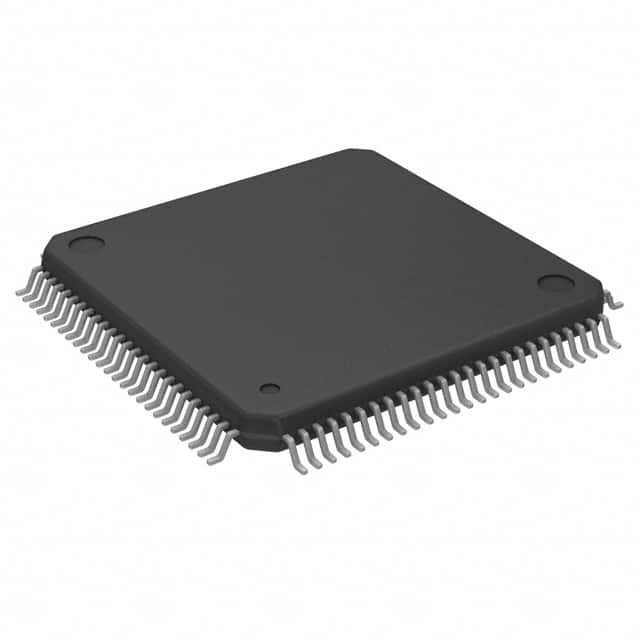Szczegóły produktu można znaleźć w specyfikacjach.

Z8038018FSC00TR
Product Overview
- Category: Integrated Circuit (IC)
- Use: Digital Signal Processor (DSP)
- Characteristics: High-performance, low-power consumption
- Package: Surface Mount Technology (SMT)
- Essence: Advanced signal processing capabilities
- Packaging/Quantity: Tape and Reel, 3000 units per reel
Specifications
- Architecture: Harvard
- Clock Speed: 80 MHz
- Data Bus Width: 16-bit
- Program Memory Size: 64 KB
- RAM Size: 4 KB
- Operating Voltage: 3.3V
- Operating Temperature Range: -40°C to +85°C
Detailed Pin Configuration
The Z8038018FSC00TR has a total of 48 pins. The pin configuration is as follows:
- VDDA: Analog Power Supply
- VDDD: Digital Power Supply
- AVSS: Analog Ground
- DVSS: Digital Ground
- RESET: Reset Input
- XTAL1: Crystal Oscillator Input
- XTAL2: Crystal Oscillator Output
- TEST: Test Mode Select
- TMS: JTAG Test Mode Select
- TCK: JTAG Test Clock
- TDI: JTAG Test Data In
- TDO: JTAG Test Data Out
- IRQ0: Interrupt Request 0
- IRQ1: Interrupt Request 1
- IRQ2: Interrupt Request 2
- IRQ3: Interrupt Request 3
- A0-A15: Address Bus
- D0-D15: Data Bus
- RD: Read Control
- WR: Write Control
- CS: Chip Select
- WAIT: Wait State
- INTA: Interrupt Acknowledge
- INTB: Interrupt Acknowledge
- INTM: Interrupt Mask
- RXD: Serial Data Receive
- TXD: Serial Data Transmit
- SCK: Serial Clock
- SS: Slave Select
- MOSI: Master Output Slave Input
- MISO: Master Input Slave Output
- SDA: Serial Data
- SCL: Serial Clock
- ALE: Address Latch Enable
- AD0-AD7: Address/Data Bus
- RDY: Ready
- VPP: Programming Voltage
- PSEN: Program Store Enable
- EA: External Access
- RSTOUT: Reset Output
- TEST1: Test Mode Select
- TEST2: Test Mode Select
- TEST3: Test Mode Select
- TEST4: Test Mode Select
- TEST5: Test Mode Select
- TEST6: Test Mode Select
- TEST7: Test Mode Select
- TEST8: Test Mode Select
Functional Features
- High-performance digital signal processing capabilities
- Low-power consumption for energy-efficient operation
- Harvard architecture for efficient program execution
- Extensive interrupt handling capabilities
- Serial communication interfaces for data transfer
- Flexible test mode selection for debugging purposes
Advantages and Disadvantages
Advantages: - High-performance DSP capabilities enable complex signal processing tasks - Low-power consumption extends battery life in portable applications - Harvard architecture enhances program execution efficiency - Extensive interrupt handling capabilities allow for real-time responsiveness - Serial communication interfaces facilitate data transfer with external devices - Flexible test mode selection simplifies debugging and testing processes
Disadvantages: - Limited program memory size may restrict the complexity of applications - Small RAM size may limit the amount of data that can be processed simultaneously - Operating temperature range may not be suitable for extreme environments
Working Principles
The Z8038018FSC00TR is a digital signal processor (DSP) that utilizes the Harvard architecture. It operates at a clock speed of 80 MHz and has a 16-bit data bus width. The DSP executes instructions stored in its program memory to perform complex signal processing tasks.
The device features interrupt handling capabilities, allowing it to respond to external events in real-time. It also includes various serial communication interfaces, enabling data transfer with other devices. The DSP's low-power consumption ensures energy-efficient operation, making it suitable for battery-powered applications.
Detailed Application Field Plans
The Z8038018FSC00TR finds applications in various fields, including:
- Audio Processing: The DSP's high-performance capabilities make it ideal for audio signal processing applications such as noise cancellation, equalization, and audio effects.
- Communications: With its serial communication interfaces, the DSP can be used in communication systems for tasks like modulation, demodulation, and error correction.
- Industrial Automation: The device's real-time responsiveness and low-power consumption make it suitable for industrial automation applications, including motor
Wymień 10 typowych pytań i odpowiedzi związanych z zastosowaniem Z8038018FSC00TR w rozwiązaniach technicznych
Sure! Here are 10 common questions and answers related to the application of Z8038018FSC00TR in technical solutions:
Q: What is Z8038018FSC00TR? A: Z8038018FSC00TR is a specific model or part number of a technical component used in various electronic devices.
Q: What are the typical applications of Z8038018FSC00TR? A: Z8038018FSC00TR is commonly used in embedded systems, microcontrollers, IoT devices, and other electronic applications that require processing power and control.
Q: What is the operating voltage range for Z8038018FSC00TR? A: The operating voltage range for Z8038018FSC00TR is typically between 2.7V and 5.5V.
Q: What is the maximum clock frequency supported by Z8038018FSC00TR? A: The maximum clock frequency supported by Z8038018FSC00TR is usually around 80 MHz.
Q: Does Z8038018FSC00TR have built-in memory? A: No, Z8038018FSC00TR does not have built-in memory. It requires external memory components for data storage.
Q: Can Z8038018FSC00TR be programmed using a high-level language like C or Python? A: Yes, Z8038018FSC00TR can be programmed using high-level languages like C or Python, as well as assembly language.
Q: What communication interfaces are supported by Z8038018FSC00TR? A: Z8038018FSC00TR typically supports interfaces such as UART, SPI, I2C, and GPIO for communication with other devices.
Q: Is Z8038018FSC00TR suitable for battery-powered applications? A: Yes, Z8038018FSC00TR is often used in battery-powered applications due to its low power consumption and voltage range.
Q: Can Z8038018FSC00TR handle real-time tasks or time-sensitive applications? A: Yes, Z8038018FSC00TR is capable of handling real-time tasks and time-sensitive applications with proper programming and optimization.
Q: Are there any development tools or software available for Z8038018FSC00TR? A: Yes, there are various development tools, IDEs, and software libraries available for programming and debugging Z8038018FSC00TR-based solutions.
Please note that the specific details and features may vary depending on the manufacturer and version of Z8038018FSC00TR.

